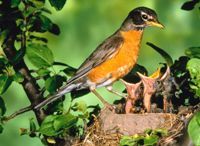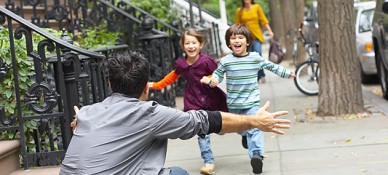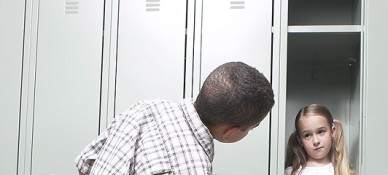Parenting Lessons From the Birds
Written by Lynn Marshall
 God cares about the birds of the air, and He cares even more about our children and families. Here are some lessons we human parents can learn from the birds.
God cares about the birds of the air, and He cares even more about our children and families. Here are some lessons we human parents can learn from the birds.
Canadians just love the reappearance of robins after winter. They herald the arrival of spring.
My first introduction to the North American robin began decades ago when, on a sunny spring day, I watched a pair of robins making their nest in a spruce tree just outside our kitchen window. Perhaps the reason I took such interest was they could have chosen any of 29 other spruce trees in the back yard for their nest. But they chose the one close to the window because it added extra security from ravens.
From my kitchen sink I could see right into their nest. The mother robin would look back at me with big open eyes, seeming to trust that one mother understood the other.
For years now I have observed and studied robin behaviors. I believe what the robins do with their young has lessons for us human parents.
A cooperative effort
This spring a robin is nesting on my bedroom window ledge. As I make the bed each morning, it is so close I could almost reach out and touch it.
This robin, too, could have nested in many nearby trees. But she chose to be close to humans for that extra security. She has four bright blue eggs in the nest. For a week, she busily carried twigs, leaves and grasses and shaped them into a curved nest. Then she visited the nearby pond for mud and with fluttering wings plastered the walls of the nest. The male often helps in nest building and especially in feeding the young.
Robins are obsessively concerned with security for their young family. Before the chicks can fly, they leave droppings in little white sacks. These miniature white garbage bags are placed in a corner of the nest, and the adult robins regularly carry them away. It is a creatively planned security measure. Droppings around the nest would alert predators to the nest’s whereabouts. So, the droppings are encased in a sack that the adult robins pick up and deposit far from the nest.
When the young robins are old enough to leave the nest, on some internal signal these white sacks no longer encompass their droppings. A kind and loving Architect surely cares for their early survival.
As the psalmist wrote: “By them the birds of the heavens have their home; they sing among the branches. … The trees of the LORD are full of sap, the cedars of Lebanon which He has planted, where the birds make their nests; the stork has her home in the fir trees. … O LORD, how manifold are Your works! In wisdom You have made them all. The earth is full of Your possessions” (Psalm 104:12, 16-17, 24).
There is loving correction
Robins love worms. And feeding on them in the lawn is invariably a teaching situation. Mother robin will pull a worm halfway out of the ground and call the baby to complete the job. When the baby will not come, mother robin will go hop-hop-hop over to the distracted young one and give it three pecks on the head. This gets immediate results.
The robins seem to instinctively give needed correction, knowing just how much is warranted—and no more. They discipline but never abuse.
Teaching young robins to fly and fend for themselves seems almost stressful to the parents. The two almost placid-looking adults sometimes become a hysterical, shrieking couple as they grapple with family duties. (Sound like some parents?)
From the time the babies leave the nest, dangers become very real. Young ones venture out onto ledges, flutter and fall sometimes. All this crashing about often attracts the attention of ravens, magpies and any stalking cat.
When threatened, the adult birds call on other robins for help. Supporting robins will shriek and dive-bomb the offending party, while the parents will hustle their grounded youngsters to shelter. After a few perilous adventures into the outside world, the young robins become streetwise to potential dangers.
Learning to make decisions
We parents, too, have to prepare our children to fly on their own. It starts early and always has a delicate balance. It is like holding a little chick in your hand. Hold it too tightly, and you can squeeze the life out of it. Hold it too loosely, and it can try to fly away before it’s ready.
Young robins have a few crashes along the way before achieving sure flight.
A confident entry into adulthood for our children also requires learning to make decisions early in life. When parents make all the decisions, they risk the consequences of teens being unprepared to stand on their own feet.
As they head toward young adulthood, teens have to face the big issues of life, such as saying a firm no to drugs, misuse of alcohol, promiscuity or crime. It is better they make mistakes while still in the nest under your loving forgiveness and guidance than to appear before a judge in a courtroom.
The robins are just here for the summer. When winter signals, they will again migrate south. I admit there is a feeling of emptiness for a few days after they depart. But I hope the valuable life lessons they teach will never leave me.
Lynn Marshall is an equestrian coach for Equine Canada. She and her husband, Graemme, serve the Church of God, a Worldwide Association, in the Toronto, Ontario, area.
For related posts about parenting, see:
- Discipline: It Sounds Like a Bad Word, but It Can Have Good Fruit!
- The Gift of Attention
- Letting Go as They Fly the Coop!










